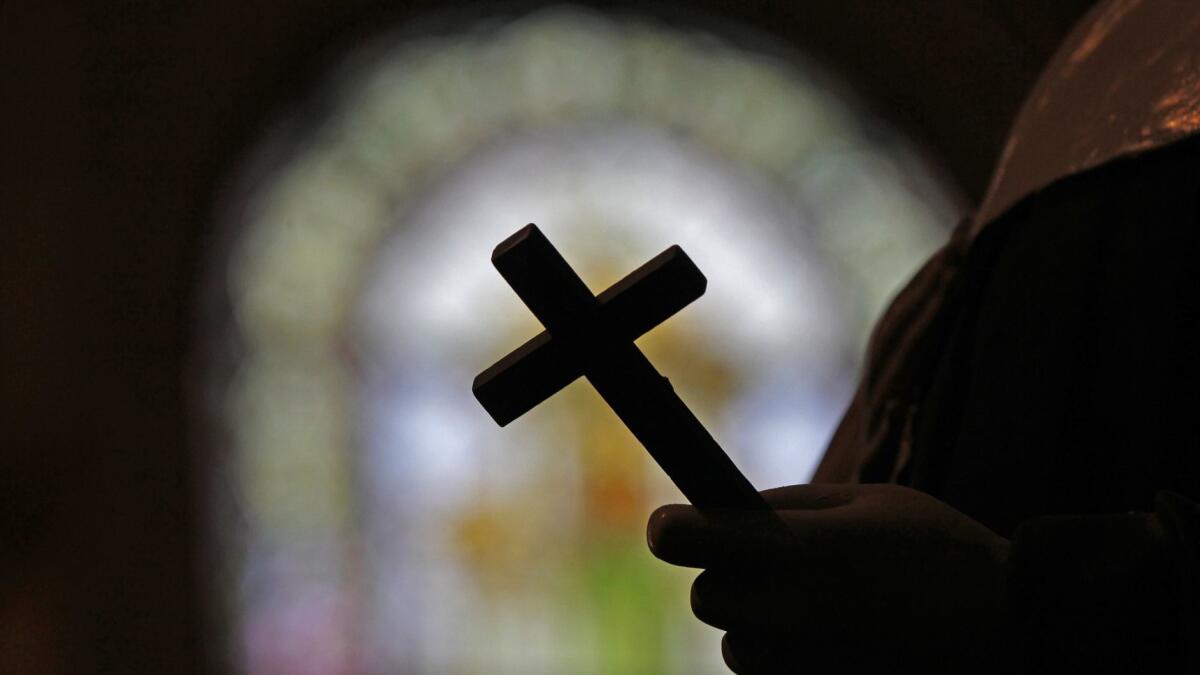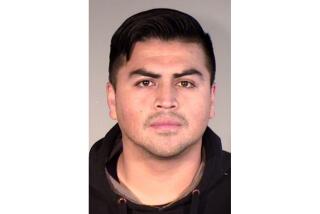L.A. Archdiocese reveals list of 54 clergy accused of abusing children

For the first time in a decade, the Archdiocese of Los Angeles on Thursday updated its list of clergy accused of molesting children, addressing renewed outcry about how the Catholic Church responds to abuse allegations.
âWe owe it to the victim-survivors to be fully transparent in listing the names of those who perpetrate this abuse,â Archbishop Jose H. Gomez said in a statement in releasing the list of 54 names.
For nearly two decades, the archdiocese has been roiled by allegations that onetime church leaders mishandled priest abuse cases, sometimes moving clergy suspected of wrongdoing to other parishes rather than punishing them and informing law enforcement. The L.A. Archdiocese paid a record $740 million in various settlements to victims and had vowed to better protect its church members. Gomez succeeded longtime Cardinal Roger Mahony, who faced strong criticism for his handling of the scandal.
Advocates for abuse victims said the action was largely symbolic and that there was much more the church could be doing to better protect children and help victims. They also noted that the California Catholic Conference spent more than $86,000 to fight a bill â vetoed by Gov. Jerry Brown in October â that would have given survivors of childhood sexual assault more time to sue those who failed to stop their abuse.
The decision to disclose names of accused clergy has been made by bishops across the United States after the release in August of a Pennsylvania report, which revealed a decades-long cover-up of child sex abuse involving more than 1,000 victims and hundreds of priests. Dioceses in San Diego, San Jose, Orange County and San Bernardino have also released names of accused clergy this year.
Of the 54 names, previously undisclosed by L.A. church leaders, the vast majority were clergy members accused of wrongdoing before 2008, the last time the archdiocese updated the list. Twenty-seven are dead.
The report reveals two cases of alleged abuse of minors reported in the jurisdiction. Those accused priests, Juan Cano and Jose Luis Cuevas, have since been investigated by law enforcement and removed from the ministry, according to the archdiocese. Cuevas was charged with groping a girl in Long Beach. He later pleaded no contest to sexual assault charges. Cano is under investigation by the Los Angeles Police Department. He could not be reached for comment.
An extern priest from Argentina, was also added to the list. He was accused in 2016 of sexual misconduct with a teenage girl during his time ministering in the Diocese of San Bernardino several years prior.
The L.A. Archdiocese said it stopped adding names to its People of God report after 2008 because parishes and schools were announcing instances of abuse as they were discovered. In an online Q&A addressing the release, the archdiocese said it chose to update the list now âout of concern for the healing of victim-survivors,â and to encourage those who may have been abused by these clergy members to come forward.
The revised list extends the roster of alleged predator priests established by a landmark legal case concluded 11 years ago. In July 2007, the diocese agreed to pay $660 million to settle claims of sexual abuse perpetrated by more than 220 priests, teachers and other church employees.
In this latest iteration of its report, the Archdiocese of Los Angeles decided to broaden its standard for which names could be disclosed. Gomez instructed the archdiocese to include names of clergy whose only allegations could not be corroborated because the priest was dead or had long ago left the jurisdiction. All claims leveled against those clergy were deemed âplausibleâ by the independent oversight board that reviews accusations for the archdiocese.
For an accusation to be considered plausible, the time and place of the complaint must match the period of service for the accused priest, according to the archdiocese.
This shift â notable in that most dioceses have chosen to name only clergy with allegations that could be corroborated â was made âout of respect and deference to the victim-survivors who made the report,â the archdiocese said.
Victim advocates say that while such disclosures are a step in the right direction, they are largely symbolic, and more needs to be done to address the churchâs systemic, decades-long cloaking of abuse.
âThey arenât doing this because of moral courage. Theyâre doing this because they feel cornered,â said clergy abuse expert Joelle Casteix, referring to the mounting public pressure felt by the Catholic Church after the release of the Pennsylvania grand jury report. Casteix said she was assaulted by a choir teacher at a Catholic school in the 1980s.
If the clergy abuse crisis is to be tackled, Casteix said, it needs to be done from outside the church â through legislative reform and law enforcement investigations. Following the Pennsylvania revelations, numerous state attorneys general have opened investigations into clerical sexual misconduct, requesting or subpoenaing diocese records. California Atty. Gen. Xavier Becerra has yet to announce such an examination in California.
In October, a civil suit was filed in Los Angeles County Superior Court on behalf of Tom Emens, who says he was abused decades ago by a Southern California priest. The suit does not seek monetary damages, but calls on 11 California dioceses â all but Stocktonâs â to release the names of every clergy member accused of sexual misconduct, as well as private records documenting abuse.
Tim Lennon, president of the Survivors Network of Those Abused by Priests, said that many of the names should have been released years ago. Even still, he said, such disclosures provide some measure of comfort to those who may have kept their abuse secret. And it could motivate other survivors to come forward, he said.
âMost survivors believe that they were the only one, that it just happened to them,â said Lennon, who was raped by a Roman Catholic priest when he 12 years old. âThis provides a public acknowledgment of the harm that they suffered.â
The Archdiocese of L.A. said it will now revise the Report of God regularly as allegations are made or substantiated by its oversight board.
âIt is our hope to not have to update the list ever again,â said archdiocese spokeswoman Adrian Alarcon.
Twitter: @LauraMNewberry
UPDATES:
4:15 p.m. Updates with more information and reaction.
Originally published at 1:15 p.m.
More to Read
Sign up for Essential California
The most important California stories and recommendations in your inbox every morning.
You may occasionally receive promotional content from the Los Angeles Times.











